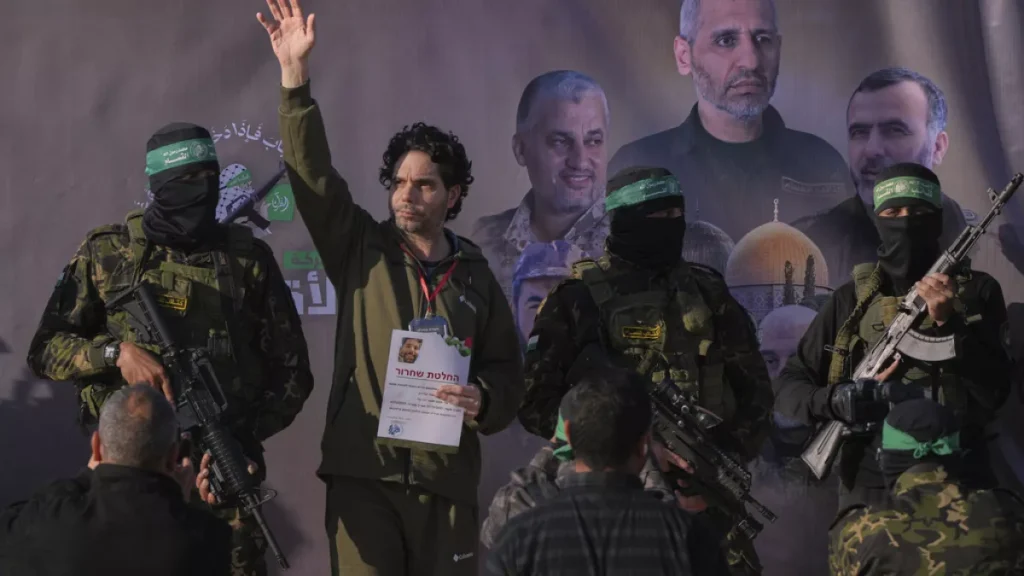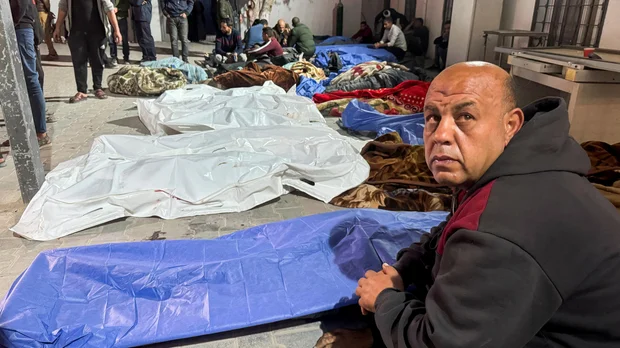Deir al-Balah, Gaza Strip — Israel launched new strikes against Hamas, killing more than 200 people, according to Palestinian officials, and promised “increasing military force” after talks on further hostage releases stalled, Israel’s Office of the Prime Minister said Monday. The resumption of Israel’s assault came after almost two months of relative calm in Gaza under a ceasefire the U.S. helped to broker, but which Israel and Hamas could not agree on how to continue.
Israeli Prime Minister Benjamin Netanyahu’s office said in a statement its military is “currently attacking targets of the Hamas terrorist organization throughout the Gaza Strip, to achieve the war goals as determined by the political echelon, including the release of all our hostages — living and dead.“
“From now on, Israel will act against Hamas with increasing military force,” the prime minister’s office said.
The statement said Israel was resuming military strikes because of Hamas’ repeated refusals to release its hostages and its rejection of all offers it received from the U.S. presidential envoy Steve Witkoff and mediators.
Israel has resumed military operations in Gaza after the failure of ceasefire negotiations.
Israel Vows to Escalate Military Action Against Hamas
Israeli Defense Minister Israel Katz issued a strong warning to Hamas, declaring that if all hostages are not released, Israel will unleash “forces they have never known before.” He emphasized that Israel will not stop fighting until every hostage is returned and all military objectives are achieved.
The escalation comes after ceasefire negotiations stalled, with Hamas refusing to meet Israel’s demands. Over the weekend, U.S. Presidential Envoy Steve Witkoff also warned Hamas that failure to release hostages would result in severe consequences.

Trump Administration Backs Israeli Strikes
The White House confirmed that President Trump was consulted on Israel’s latest attacks. Press Secretary Karoline Leavitt stated that Hamas had an opportunity to extend the ceasefire by releasing more hostages but instead chose war.
National Security Council spokesman Brian Hughes reinforced this stance, saying:
“Hamas could have released hostages to extend the ceasefire but instead chose refusal and war.”
Hamas Condemns Israeli Attacks
In response to Israel’s renewed military offensive, Hamas official Taher Nunu criticized the international community, urging it to intervene.
“The international community faces a moral test: either it allows the return of the crimes committed by the occupation army or it enforces a commitment to ending the aggression and war against innocent people in Gaza,” Nunu stated.
Hamas has accused Israel of violating the ceasefire and warned that further airstrikes could endanger the remaining hostages.

The Ceasefire’s Fragile End
The latest strikes come during the Muslim holy month of Ramadan, breaking nearly two months of relative calm. The first phase of the ceasefire, which began in December, ended on March 1. Despite this, a fragile pause in heavy fighting remained in place until Monday.
However, negotiations over a second phase of the ceasefire have failed.
- Israel demands the immediate release of nearly 60 remaining hostages.
- Hamas seeks an Israeli military withdrawal from Gaza.
Despite U.S., Qatari, and Egyptian mediation efforts, both sides have been unable to agree on a path forward.
Israel’s Aid Blockade on Gaza
In early March, Israel cut off aid supplies to Gaza, restricting the entry of food, medicine, and humanitarian goods. The move was part of Israel’s strategy to pressure Hamas into accepting a ceasefire extension proposed by the Trump administration.
Under this new ceasefire proposal, Israel demanded Hamas immediately release half of the remaining hostages—a significant shift from the original agreement.
On Friday, Hamas tentatively accepted a deal to release:
- One living American-Israeli hostage
- The bodies of four dual-nationals who died in captivity
However, Netanyahu’s office rejected the offer, calling it an attempt to manipulate ongoing negotiations in Qatar.
The War’s Devastating Toll
The conflict began on October 7, 2023, when Hamas launched a deadly attack on Israel, killing approximately 1,200 people and taking 250 hostages.
Israel responded with a massive military offensive, leading to:
- Over 48,000 Palestinian deaths, according to Gaza health officials
- An estimated 90% of Gaza’s population displaced
- Severe humanitarian crises due to restricted aid supplies
While Israel claims it only targets militants, the Gaza Health Ministry reports that over half of the casualties are women and children.
What’s Next?
As Israel intensifies its military operations and Hamas refuses to concede to new ceasefire terms, the conflict appears far from over.
The Trump administration continues to stand behind Israel, while mediators from Egypt, Qatar, and the U.S. struggle to salvage what remains of the ceasefire agreement.
With each passing day, the chances of a diplomatic resolution shrink, and the humanitarian crisis in Gaza continues to worsen.



Leave a Reply